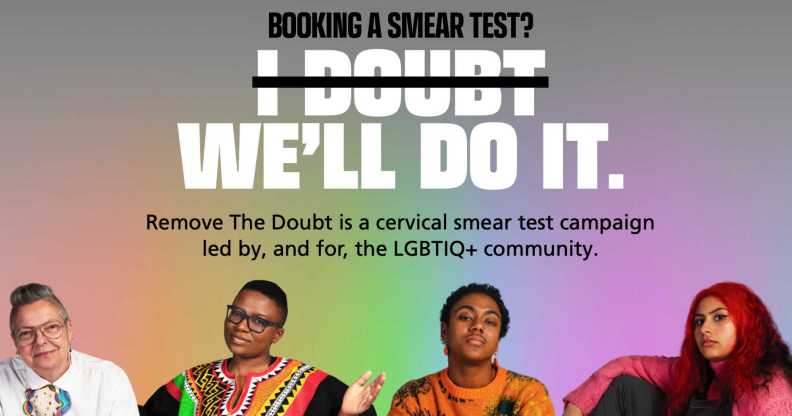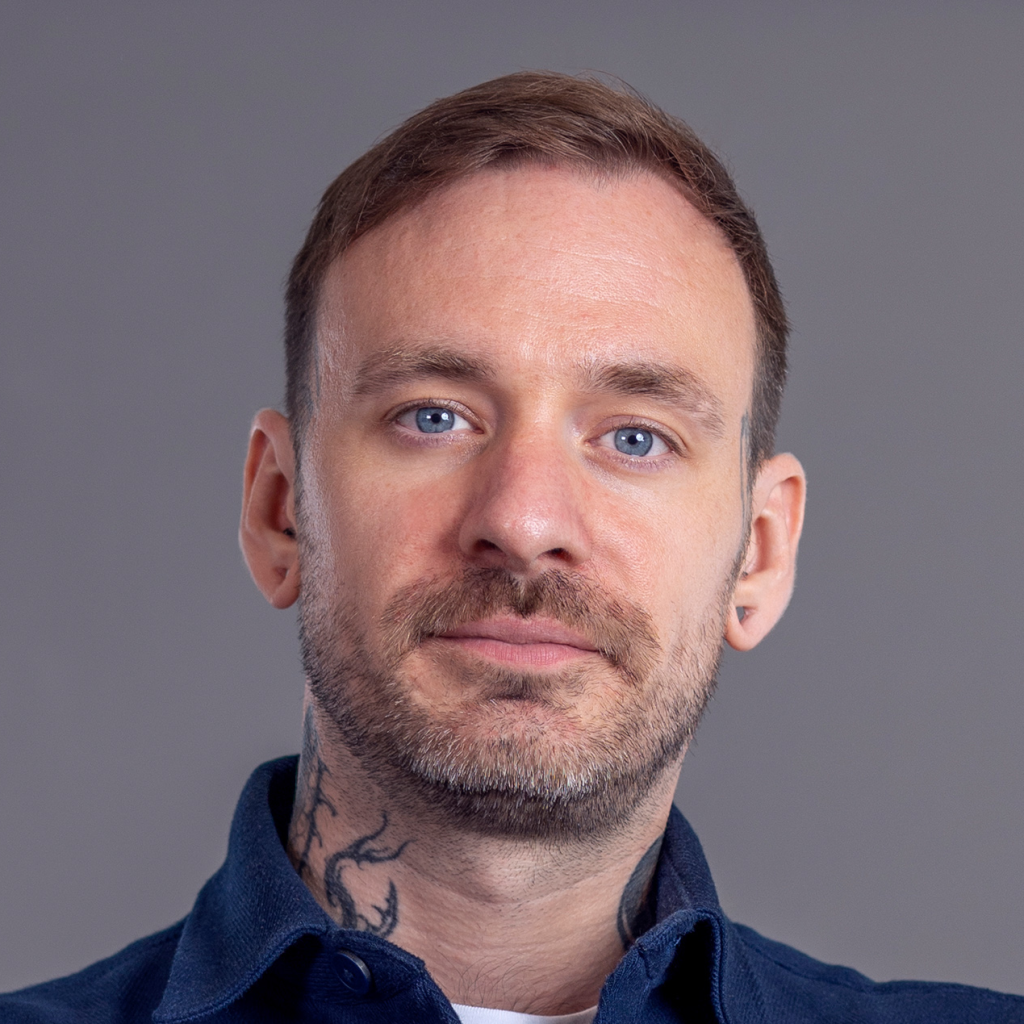Trans-inclusive cervical cancer campaign defies anti-LGBTQ+ hate: ‘We deserve to be screened’

Remove the Doubt is a dedicated cervical screening awareness campaign created by and intended for the LGBTIQ+ community. (Live Through This)
As a cancer charity launches an LGBTQ-focused cervical screening awareness campaign, its CEO tells PinkNews that this life-saving mission is more important than resistance to inclusive language from anti-trans “detractors”.
Live Through This is the UK’s only specialist cancer charity for the LGBTQ+ community, and its dedicated NHS cervical cancer screening campaign, Remove the Doubt, addresses inequalities and misinformation around smear tests that impacts LGBTQ+ people in the UK.
Remove the Doubt as a campaign name works on two levels – it aims to banish the uncertainty around both whether someone is healthy, and whether they can safely and comfortably access treatment.
The NHS’s cervical screening programme is currently available to everyone between the ages of 25 and 64 who has a cervix, including women, trans men, non-binary people assigned female at birth and some intersex people.
However, LGBTQ+ people are less likely to access vital screenings, with 15 per cent of lesbian and bisexual women over 25 never having had a smear test, compared to seven per cent of women over 25 in general.
Research from Stonewall in 2018 found that 14 per cent of LGBTQ+ people – and 37 per cent of of trans people – have avoided accessing healthcare services because they fear being discriminated against.
Some of the reasons why uptake is lower among LGBTQ+ people include myths around lesbians “not needing” cervical screenings – which is absolutely not true – and systemic issues, such as trans men and non-binary folks not being invited for smear tests.
PinkNews spoke to the founder and CEO of Live Through This, Stewart O’Callaghan, about what the Remove the Doubt initiative means for the LGBTQ+ community and why there’s still so much resistance to inclusive language in healthcare.
“We put the community front and centre in the campaign. It’s about empowering people with tools so they know what they can ask for,” O’Callaghan says. “We all want to know we’re looking after ourselves, right?”
Through LGBTQ+ focus groups, Remove the Doubt prioritises lived experience and the variety of people who need to access cervical smears. It also provides webinars for NHS sample takers, to educate them on the language the LGBTQ+ community uses to refer to their bodies, and how to treat LGBTQ+ patients with respect and make appointments a better experience.

O’Callaghan has a personal stake in cancer care for LGBTQ+ folks, as they were diagnosed with chronic myeloid leukaemia in 2016, after 10 years of working as a tattoo artist.
“It turned my life upside down. But now, you know, you get to do cool stuff like this campaign. Honestly, it has been getting tougher with the hostility in the UK, especially towards trans healthcare.
“But I think it just means the mission is even more evident, that we have to keep pushing.”
Resistance to inclusive language in healthcare
Against a backdrop of increasing anti-trans sentiment in the UK and US, a West Yorkshire council was forced to delete an inclusively-worded tweet about cervical screenings after a transphobic backlash earlier this month.
The tweet, posted by Calderdale Council on 11 April, encouraged “everyone” aged between 25 and 64 with a cervix to attend a free cervical cancer screening. Sadly, it was met by attacks from people who felt the council was trying to “erase women” by using inclusive language.
Calderdale Council removed its original tweet and posted a thread apologising for offence caused.
However, the LGBTQ+ community were quick to praise the wording of the original tweet and Trans Activism UK called Calderdale’s language perfect, saying the aim of the campaign “takes priority over transphobic bullies”.
O’Callaghan’s take is that although some people are “resistant to changes in language”, trans and non-binary people deserve to be included in life-saving healthcare initatives.
“Cancer is serious, and screening saves lives,” they told PinkNews. “So inclusive language reaching more people and getting them more likely to engage in screening is a fantastic thing.”
“Variation in gender expression and identity is a really important part of human experience, and we see it globally. So when people try to reduce that beautiful variation down to to finite points, it does do a disservice to people’s experience, but then also it starts to bleed into people not feeling represented by health, by messaging, feeling excluded by it, and therefore being less likely to engage with it.
“If you look at the GP patient survey, non-binary people are having the poorest experience in their GP clinics. It’s because the systems we built in healthcare are very binary. And therefore, it doesn’t really take into account that breadth of experience, and everyone who ultimately is going to be accessing healthcare.
“They exist, we exist – and we deserve to be screened.”
‘There are things you can do to feel empowered’
The Live Through This website offers a host of crucial tips for people attending cervical screening appointments, as it can end up not being “the most comfortable experience, to put it lightly”.
“But we also know that it literally saves lives,” O’Callaghan continues. “There are things you can do to feel empowered, in control and maintain that level of autonomy in the appointment.
“The reality is that every day, I speak to queer people affected by cancer. I hear their experiences, and I reflect on my own. And it’s more important to me that people like myself have the ability to connect with each other, support each other, encourage good health in our peers, and get diagnosed early.
“That’s the prevailing message. And as much as possible, I try and avoid detractors who would rather that not be the case for us.”
O’Callaghan also acknowledges that the current pressure on NHS services can make people hesitant to ask for adjustments at appointments.
“I think there is that British sensibility, I don’t want to cause a fuss, you know, particularly knowing that the NHS is very busy and strained.
“But I think asking for adjustments to your appointment that make it a possibility that you’re able to attend is never asking too much.”

